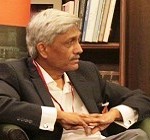Since the outbreak of the global financial crisis, governments and policy makers have intervened in markets massively, and in multiple forms – injecting liquidity, recapitalizing banks, providing fiscal stimuli, and buying out doubtful bonds to plug holes in the balance sheets of financial firms. The former Whole Time Member of Securities and Exchange Board of India (SEBI), Prashant Saran, shares his insights with Gateway House’ Samir N. Kapadia on India’s growth agenda.
Q. What do you make of the Reserve Bank of India’s (RBI) recent comments regarding the country’s fiscal health, specifically their concern with excessive government spending?
There is nothing new about the comments from the RBI. They have been asking the government to take measures to control fiscal deficits and institute reforms for decades. For instance, Governor Chakravarthy Rangarajan advocated for the passage of the Fiscal Responsibility and Budget Management Act in 2003 with defined targets to reduce the fiscal deficit and institutionalize financial discipline. The Tarapore Committee Report has also made recommendations to lower fiscal deficits to enable capital account convertibility. None of these targets have been met even though the central bank’s position has been clear over the years.
Q. Are India’s public sector banks ‘too big to fail’? How would you rate our banking system compared to others in the world?
Public sector banks in India have always been big. But they are not meant to fail. There is a sovereign guarantee, which is neither explicit nor implicit. It is in the mind of the depositor. People consider it safe to deposit their money in a public bank. This is specifically true for India where people assume that government is safe and anything private is not. The government has that kind of credibility.
Q. Is India’s growing external debt exposure a cause for concern after what we have seen in Europe?
The comparison with Europe is not appropriate. The Indian government has never issued sovereign debt outside India, ever. Government securities or g-secs have been picked up by Foreign Institutional Investors (FIIs). These FIIs are investing in short-term debt because of the risks associated with long-term investments such as the uncertainty with interest rates which might have been a cause of worry. But the amounts are strictly controlled. Bulk of bilateral, multilateral debt and ECB has been incurred as long term which reduces the risk to the country. Unlike Europe, there is very little sovereign debt held by outsiders. Most of it is commercial. Even the 1991 balance of payment crisis stemmed from a short-term commercial debt crisis. It’s not sovereign debt that can cause a crisis in India – it’s commercial.
Q. What is your opinion on LIBORgate? What should be done to maintain the integrity of the global banking system?
Let’s be very clear about this. Rates whether LIBOR or gold have been fixed by the big banks over decades or even centuries. It was called ‘fixing’. It is a question of changed concept of propriety. It is time to improve the system.
Q. As faith in the western banking architecture dwindles, should India support alternative arrangements such as currency swap agreements with major trading partners?
India had a currency arrangement with Russia in the 1950s, but there have been reservations about its advantage. Today, we have something similar with Iran. But Iran has something we need – oil. In such currency agreements, one has to weigh the costs and benefits very carefully. For instance, the Chinese will not take rupees unless they get a bargain somewhere else.
Prashant Saran recently demitted office as a Whole Time Member of SEBI, a position he held since 2009. Prior to that, Saran had a 29-year-inning at the RBI, where he was Chief General Manager and Head – Department of Banking Operations and Development from 2003 to 2009.
This interview was exclusively conducted for Gateway House: Indian Council on Global Relations. You can read more exclusive content here.
For interview requests with the author, or for permission to republish, please contact outreach@gatewayhouse.in.
© Copyright 2012 Gateway House: Indian Council on Global Relations. All rights reserved. Any unauthorized copying or reproduction is strictly prohibited.


